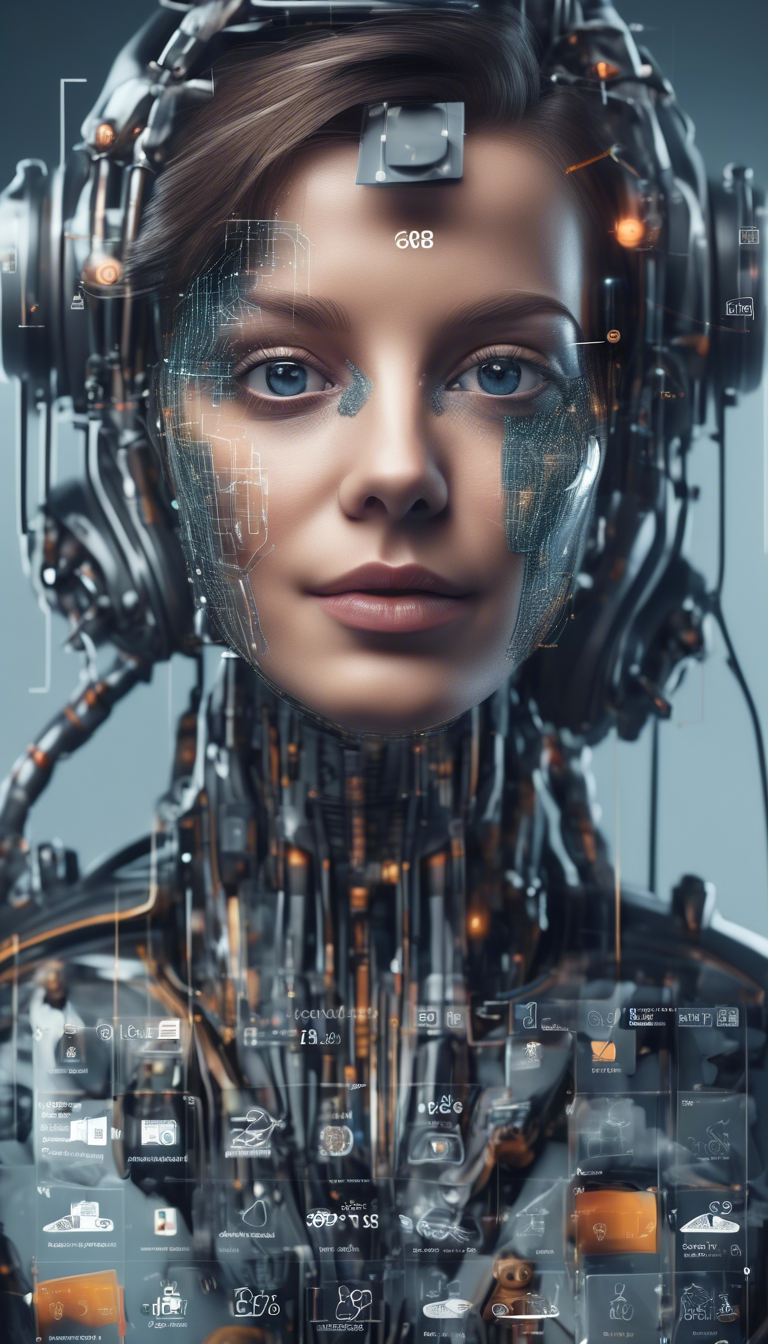The Impact of AI in Content Creation: Current Statistics and Trends
The emergence of artificial intelligence has profoundly influenced various fields, including content creation. As businesses seek innovative ways to capture attention and enhance engagement, AI tools and technology have become critical assets in their arsenal. The statistics associated with AI in content creation reveal a significant shift and highlight the trends shaping the future of marketing.
Recent data indicates that over 70% of marketers believe AI will play a vital role in content marketing by 2025. This perspective stems from AI’s ability to automate tasks, deliver personalized content, and analyze vast amounts of data to inform strategic decisions. For instance, AI-driven analytics can pinpoint which types of content resonate most with audiences, paving the way for more effective content strategies.
Here are some noteworthy statistics that illustrate the growing impact of AI in content creation:
- According to a survey by MarketingProfs, 61% of marketers reported using AI tools to assist in content creation in 2023.
- A study by Content Marketing Institute found that 80% of leading marketers are utilizing AI-powered content creation tools.
- Data from Gartner forecasts that AI-generated content will account for 15% of all digital content by 2024.
- Research from Quora indicates that AI can reduce content creation time by up to 50%, allowing teams to focus on strategic planning rather than repetitive tasks.
- According to Adobe, personalized content powered by AI has been shown to increase engagement rates by 39%.
Such insights paint a picture of a rapidly evolving landscape where AI technology is becoming increasingly vital. The demand for quick, accurate, and engaging content means that companies are turning to AI tools not just for speed, but also for the enhanced quality of their output. AI-generated content, including articles, social media posts, and marketing materials, tends to exhibit high standards of coherence and relevance.
One of the most exciting trends in AI content creation is the rise of natural language generation (NLG). This technology helps generate human-like text, which can be applied in various contexts including news summaries, product descriptions, and even creative writing. Businesses leveraging NLG can produce large volumes of content in a fraction of the time it would take human writers, thereby meeting the demands of today’s fast-paced digital environment.
Moreover, AI’s ability to analyze user data allows it to create customized content experiences, enhancing user engagement. For example, AI can assess user behavior on websites and suggest tailored content that meets specific needs. This trend is evident in the growing integration of AI algorithms in platforms like Netflix and Spotify, which adapt content recommendations based on user interactions and preferences.
However, there are challenges accompanying this rapid shift. A significant concern revolves around content authenticity and originality. While AI excels at generating content, it lacks a human touch and emotional intelligence, which are often vital in building connections with audiences. Furthermore, there’s the risk of content homogenization, where too many brands rely on similar AI tools, resulting in a lack of diversity in voices and styles.
To maintain authenticity while utilizing AI, brands should consider a hybrid approach, combining AI-generated content with human insights. This synergy can foster creativity while ensuring that brand messages remain genuine and relatable. By doing so, companies can embrace the efficiency of AI without sacrificing the storytelling aspect that resonates with audiences.
The impact of AI in content creation is undeniable, with statistics revealing an ever-increasing reliance on technology to streamline processes and enhance engagement. As the tools continue to evolve, they will dramatically shape how content is produced and consumed. Staying abreast of these innovations will be crucial for marketers aiming to thrive in an increasingly competitive landscape.
The integration of AI in content creation represents a paradigm shift. By understanding current statistics and trends, businesses can better navigate this landscape, embracing the opportunities AI offers while being mindful of the human element that remains essential for sustained audience connections.
Future Predictions: How AI Will Shape Content Creation in the Next Decade
As we look ahead to the next decade, the role of artificial intelligence (AI) in content creation is set to expand significantly. Innovations in AI technology will likely redefine how content is generated, distributed, and consumed. With its rapid evolution, several trends and predictions are taking shape, indicating how AI will influence various aspects of content creation.
Hyper-Personalization
One of the most promising advancements in AI is hyper-personalization. As algorithms become more sophisticated, they will learn to analyze individual user behavior more accurately. This capability will enable brands to produce tailored content that meets the specific preferences and expectations of each user. The reliance on data analytics will empower companies to understand audience sentiments, leading to a more engaging user experience.
AI-Generated Content
AI tools, such as natural language processing (NLP) models, are increasingly able to create high-quality written content. By 2030, we can expect a surge in AI-generated articles, blogs, and marketing materials. These tools will dramatically reduce the time and effort required to produce content, allowing content creators to focus more on strategy and creativity. Nevertheless, it is important for human oversight to ensure authenticity and maintain brand voice.
Enhanced SEO Strategies
AI will undoubtedly reshape search engine optimization (SEO). Predictive analytics and machine learning algorithms will help marketers refine their content strategies based on user queries and search behaviors. As search engines evolve, AI tools will offer insights on keyword optimization and content performance, allowing creators to adapt and enhance their approaches constantly. Some key developments include:
- Advanced keyword discovery tools that understand context better than ever.
- Real-time performance tracking of content against evolving search algorithms.
- Content optimization recommendations based on user engagement metrics.
Visual and Multimedia Content
AI is also revolutionizing visual and multimedia content creation. With advancements in graphic design tools, video editing software, and virtual reality applications, creators will harness AI to develop compelling visual narratives. For instance, AI-driven platforms can create stunning graphics or promotional videos in a fraction of the time it would take a human designer. This transformation provides opportunities for businesses to produce high-quality content on a larger scale.
Content Distribution Automation
The future of content distribution will largely rely on AI-driven automation. By utilizing machine learning algorithms, businesses can identify optimal times and channels for sharing their content. AI will help brands segment their audiences, ensuring that the right content reaches the right people at precisely the right moment. Some of the advancements we anticipate include:
- Automated social media posting with real-time engagement tracking.
- Smart email marketing campaigns tailored to individual user preferences.
- Content curation tools that analyze trending topics and suggest relevant resources.
Augmented Creativity
AI will not replace human creativity but will enhance it. Creators will use AI tools to brainstorm ideas, refine concepts, and even co-create content. This collaboration can lead to innovative storytelling that captivates audiences. For instance, AI can generate plot ideas for writers or suggest visuals that complement a narrative. The synergy between human ingenuity and AI capabilities will redefine the creative process.
Ethical Considerations and Authenticity
As AI tools become more prevalent in content creation, ethical considerations will become paramount. Issues such as copyright, authenticity, and the potential misuse of AI in disinformation campaigns will demand careful attention. It will be essential for organizations to maintain content authenticity while leveraging AI advancements. Establishing guidelines and best practices will be critical to navigate these challenges effectively.
The future of content creation will be profoundly influenced by AI. The next decade promises to deliver innovations that enhance personalization, streamline production, improve SEO, and augment human creativity. As businesses adapt to these trends, they will unlock new possibilities for engagement, ultimately reshaping how audiences interact with content. Embracing these changes will be vital for staying ahead in the competitive landscape of digital content creation.
Conclusion
As we delve into the landscape of content creation, the integration of AI technologies emerges as a transformative force reshaping how we conceptualize, produce, and interact with digital content. The current statistics underscore a growing acceptance and reliance on AI tools among marketers and businesses alike. With over 70% of content creators expressing a belief that AI significantly boosts their efficiency, it is clear that these technological advancements are not merely trends, but rather foundational shifts in how content is generated and disseminated. From generating blog posts to crafting social media updates, AI’s capacity for language processing and predictive analytics is enhancing the creativity and productivity of human writers. This synergy between human creativity and machine efficiency is leading to a more dynamic and engaging content landscape.
Moreover, AI’s influence extends beyond just production processes. Current trends show that brands are utilizing AI-driven data analytics to customize content strategies based on audience preferences and behaviors. Surprise insights reveal that nearly 80% of marketers are leveraging AI to analyze customer interactions, helping them tailor their messaging more precisely. This leads to better engagement rates and ultimately, improved ROI. Consequently, businesses that ignore these statistics risk falling behind as their competitors leverage AI to deliver personalized and timely content.
Looking forward, the future predictions surrounding AI in content creation are compelling. Industry experts anticipate that within the next decade, AI will not only shape content just in terms of creation but will revolutionize how content is consumed. With advancements in technology such as natural language processing and machine learning, we can expect personalized content to become the norm. Imagine a future where your favorite news website curates articles based on your specific interests as they evolve, using AI algorithms that learn from your reading habits. This paradigm shift insists on deeper engagement from audiences—individualized digital experiences that are both relevant and insightful.
Furthermore, developments in AI will likely contribute to enhanced authenticity in brand storytelling. As consumers increasingly gravitate toward brands that resonate with their values, the ability of AI to analyze vast amounts of data will empower businesses to create narratives that are not only efficient but also emotionally intelligent. Statistically, studies indicate that brands employing AI for emotional analytics see higher customer loyalty. Trust and relatability in content will become essential for brand growth in an ever-crowded marketplace.
The ethical implications cannot be overlooked in the embrace of AI in content creation. Research indicates a burgeoning interest among consumers for transparency about how content is generated. As AI takes a more prominent role, it will be critical for brands to maintain honesty and integrity in their storytelling. The lines between human-written and AI-generated content can blur easily, leading to questions about authenticity and credibility. Consequently, a balance between leveraging AI’s capabilities while ensuring ethical content practices will be paramount.
Ultimately, organizations that adapt to these evolving statistics and trends will find themselves at the forefront of a new era in content creation. Embracing AI isn’t solely about the ability to crank out a high volume of content; it’s about enhancing the overall quality and relatability of that content. The tools and technologies at our disposal can help unlock new levels of creativity, inviting content creators to dig deeper into the emotional landscapes of their audiences.
As the decade unfolds, we should prepare for a content ecosystem that integrates AI not just for efficiency, but also as a collaborator in creativity. The statistics and predictions paint a vivid picture of an industry on the cusp of monumental change—one where AI and human ingenuity work in tandem, pushing the boundaries of what content can be. Whether you’re a content creator, marketer, or a business owner, understanding the implications of AI’s integration into content creation will be crucial. Staying informed and adaptable will allow you to harness the power of AI, ensuring that your content not only meets the demands of today but also anticipates the desires of tomorrow’s audiences.


